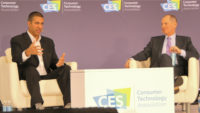CES 2020: (Finally) a Fireside Chat with FCC Chair Ajit Pai
January 8, 2020
Following a discussion with FTC chair Joseph Simons, CTA chair/chief executive Gary Shapiro welcomed FCC chair Ajit Pai who has tried unsuccessfully to speak at CES for the last two years. Since the change in net neutrality laws, which met with a lot of pushback, noted Pai, “speeds are up, broadband infrastructure is up, more fiber was laid in 2019 than in any other year.” “We often heard that this was the end of the Internet,” Pai said. “But more Americans get faster Internet than ever before.”
Pai noted that his focus now is on tribal communities, rural areas and other places where high-speed Internet has been a rare commodity. “They want opportunities,” he said. “Not political back and forth.”

With regard to ongoing discussions about net neutrality, Pai said, “I got tweets over the Internet that I destroyed the Internet.” “I want to focus on the merits of the issue and put the rhetoric in the rear-view mirror,” he added. The 5G FAST Plan is a strategy — and an acronym that stands for Facilitate America’s Superiority in 5G Technology.
“We’ve been aggressively executing our plan’s points,” said Pai. “Major carriers are now advancing 5G. We’re putting the building blocks into place.”
Among the barriers to 5G implementation, he said, are cost and the human capital to construct the networks. “The scale has to be pretty massive for a national network,” he said. “It isn’t cheap to build a 5G network.” One of the biggest problems is “just getting work crews to build the network,” especially in smaller and rural areas, in part because “it’s a physically demanding job.”
The big cities will be the first use case for 5G connectivity. “But fixed wireless is another great solution,” said Pai. “I’m bullish on 5G for the tribal areas, as it gives those communities a chance to enjoy the benefits of 5G.”
Precision agriculture is another sector that will benefit from high-speed, low latency upload and download of data, Pai added, as well as telemedicine, “another important use case.” “Our goal is remove spectrum as a constraint,” he said.
When Shapiro asked what the biggest impediment is, Pai laughed and said, “In Washington, D.C., there are three things you don’t discuss: religion, politics and sharing spectrum.” “But there has to be a way to share spectrum assets in a way that benefits consumers,” he said.

No Comments Yet
You can be the first to comment!
Sorry, comments for this entry are closed at this time.